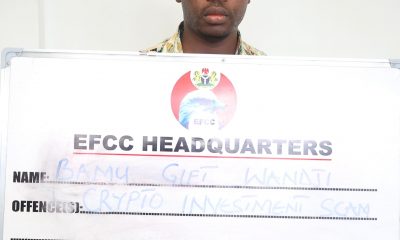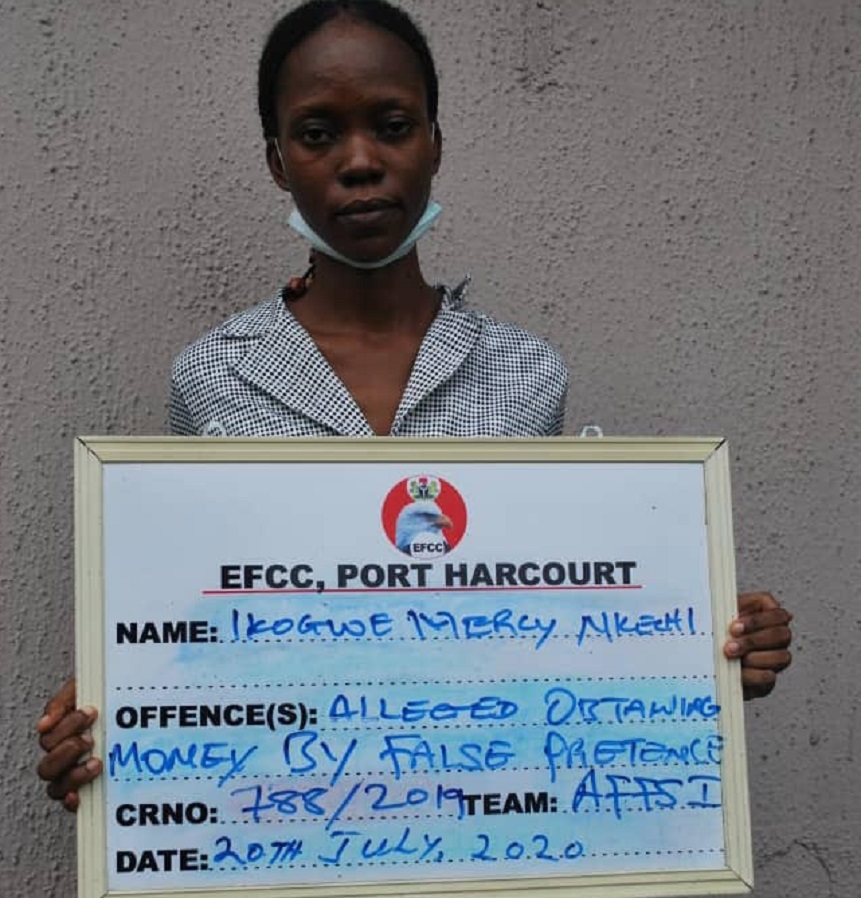Economy
SEC to go Tough on Illegal Investment Schemes After CBEX Crashing

By Adedapo Adesanya
The Securities and Exchange Commission (SEC) is moving to apply a more forceful and coordinated enforcement regime against unregistered and illegal “phony” investment schemes, otherwise known as Ponzi schemes.
This is coming after Crypto Bridge Exchange (CBEX) reportedly crashed, leading to many investors unable to withdraw their funds.
The issue has drawn wide conversations around the unchecked activities of Ponzi scheme operators until it is too late to cry when the head is cut off.
The Director-General of the SEC, Mr Emomotimi Agama, said this in a statement that the commission never granted registration to CBEX operate as a digital assets exchange in Nigeria.
He urged members of the public to cease all dealings with the platform.
CBEX, operating under various names, including ST Technologies International Ltd. and Smart Treasure/Super Technology, asked the public to invest in its schemes for higher returns.
“The commission hereby clarifies that neither CBEX nor its affiliates were granted registration by the commission at any time to operate as a Digital Assets Exchange, solicit investments from the public, or perform any other function within the Nigerian capital market,” he reiterated.
He said that preliminary investigations carried out by the agency had revealed that CBEX engaged in promotional activities to create a false perception of legitimacy, noting that this was to entice unsuspecting members of the public into investing monies, with the promise of implausibly high guaranteed returns within a short timeframe.
The SEC chief emphasised that pursuant to the provisions of Section 196 of the Investments and Securities Act 2025, the commission would collaborate with relevant law enforcement agencies to take appropriate enforcement action against CBEX, its affiliates, and promoters.
“The commission uses this medium to remind the public to refrain from investing in or dealing with any entity offering unrealistic returns or employing similar recruitment-based investment models.
“Prospective investors are advised to verify the registration status of investment platforms through the commission’s dedicated portal: www.sec.gov.ng/cmos before transacting with them,” he said.
Mr Agama said that with the newly enacted Investments and Securities Act, 2025 (ISA 2025), the commission now had enhanced powers to prosecute Ponzi schemes and their promoters.
He explained that investigations were ongoing on CBEX, adding that promoters of the failed scheme would not go scot-free.
The SEC DG also said the new law had given the commission more powers and blocked loopholes in emerging areas of virtual and digital assets.
“The ISA 2025 has given the commission the legal backing to provide clarity, ensure investor protection, and enhance market confidence, especially in new and previously unregulated segments such as digital asset exchanges and online foreign exchange platforms,” he said.
He added that while the apex capital market regulator would continue to support innovations in finance and investments, the commission would maintain strict oversight in line with its enhanced investor’s protection mandate.
“We welcome innovation, but it must occur within a regulated environment that protects investors and maintains the integrity of our market.”
He recalled that even with the limited scope of the repealed Act, the SEC had maintained extensive surveillance and was able to shut down a number of Ponzi schemes, with some of the promoters, like Fahmzi Interbiz, jailed for defrauding Nigerians.
According to him, with the ISA 2025 giving the commission more powers to deal with issues, the commission will ensure that promoters of such schemes are not allowed to operate.
This comes after the Economic and Financial Crimes Commission (EFCC) also announced that it is investigating the development.
Economy
Customs to Fast-Track Cargo Clearance at Lekki Deep Sea Port

By Adedapo Adesanya
The Comptroller-General of the Nigeria Customs Service (NCS), Mr Adewale Adeniyi, has unveiled a Green Channel initiative at the Lekki Deep Sea Port as part of efforts to simplify cargo clearance, reduce delays, and improve operational efficiency for port users.
The launch marks a major step in customs’ drive to enhance trade facilitation through technology and stakeholder collaboration.
Speaking at the event in Lagos, Mr Adeniyi said the initiative was introduced by the Lekki Deep Sea Port and approved by NCS management to address persistent challenges in container stacking and examination at major ports, which often slow cargo processing.
“This particular intervention helps to move containers right from the vessel into a dedicated place where customers can have access. And between the time the container moves from the vessel to this particular place, it is tracked,” he said.
The customs boss explained that the Green Channel is designed to ensure seamless cargo movement through a dedicated corridor with minimal bureaucratic obstacles, enabling faster turnaround time for importers and other stakeholders.
He described the initiative as a product of mutual trust between the agency and its stakeholders, stressing that compliance and cooperation are essential to its success.
“What we have done today is a product of the kind of trust that we have invested in our stakeholders and the confidence that we also have in them, that they would do this in the spirit of compliance and trade facilitation,” he said.
Mr Adeniyi added that beyond easing port operations, the Green Channel supports Nigeria’s broader economic objective of building a more competitive trade environment, noting that the initiative is expected to reduce the cost and time required to do business, ultimately boosting revenue generation for the service.
Economy
Jim Ovia Denies Knowledge of Wealth Bridge Investment Scheme

By Aduragbemi Omiyale
The chairman of Zenith Bank Plc, Mr Jim Ovia, has dissociated himself from a video making the rounds, purporting that he has endorsed an investment scheme put together by Wealth Bridge.
In a statement, it was emphasised that the video of the businessman is fake, as he has no link with Wealth Bridge, which urged Nigerians to invest in the business.
The management of Zenith Bank has, therefore, advised the public to disregard videos circulated through the Greece Island Facebook handle.
The promoters of the investment scheme promised prospective customers up to N2 million in weekly returns on a contribution of N380,000.
But Zenith Bank stressed that any member of the public who conducts business with the entity does so at his or her risk, as claims in the video that the investment has the backing of the Central Bank of Nigeria (CBN) are untrue.
“The video redirects unsuspecting members of the public to an alleged Arise News webpage with the details of this scheme and an embedded registration portal for signups. This claim is also entirely false and has no connection whatsoever to the bank or its group chairman.
“For the avoidance of doubt, all the videos and promotional materials referenced above are FAKE and have nothing to do with Zenith Bank Plc or Dr Jim Ovia. The Group Chairman of Zenith Bank and the bank have no knowledge of the said investment scheme and have not entered into any partnership with the companies, individuals, or platforms behind these schemes.
“The general public is hereby advised to disregard these fraudulent communications. Anyone who engages with the Greece Island handle, Wealth Bridge, delicious sitee, AfriQuantumX, Stock market analyst 1, or any other entity on the basis of these fake videos and images published by impostors does so strictly at his or her own risk,” parts of the statement read.
Economy
FG to Review Six-Month Shea Export Ban

By Adedapo Adesanya
The federal government has assured stakeholders in the shea value chain that it would review the export ban on shea nuts, citing concerns over its impact on local producers, exporters and foreign exchange (FX) earnings.
On August 26, 2025, President Bola Tinubu directed a six-month temporary ban on the export of raw shea nuts.
According to NAN, the Minister of Industry, Trade and Investment, Mrs Jumoke Oduwole, at a stakeholders’ validation session on the ban on raw shea nuts exports in Nigeria on Thursday, said the ministry would brief the president after consultations across the value chain.
The Minister, at the gathering in Abuja, said the government recognises the right of citizens to earn a living and contribute to national development, adding that all inputs from stakeholders would be carefully reviewed and consolidated.
“All inputs from stakeholders will be carefully reviewed and consolidated before a decision is made on whether the ban should be extended immediately or deferred,” the Minister said, adding that, “The ministry will provide the president with factual and balanced information to guide further action.”
Mrs Oduwole said the ministry engaged widely with stakeholders to ensure all perspectives were considered in the ongoing policy deliberations.
The ministry, she said, received formal submissions from the umbrella association and held engagement sessions attended by various industry representatives.
The minister said the submissions were reproduced and circulated at the meeting to promote transparency and shared understanding.
“Relevant departments within the ministry worked jointly on the matter, and I personally reviewed the submissions to assess our position ahead of broader consultations,” she said.
In his remarks, the Minister of Agriculture and Food Security, Mr Abubakar Kyari, said the meeting was convened to review the ban objectively, underscoring the need for verified facts and transparency.
Mr Kyari said government decisions intend to protect jobs and encourage local value addition, adding that policies should be assessed holistically based on evidence and measurable impact.
Rationalising the ban last August, the Vice President, Mr Kashim Shettima, said while Nigeria produces nearly 40 per cent of the global Shea product, it accounts for only 1 per cent of the market share of $6.5 billion.
“This is unacceptable. We are projected to earn about $300 million annually in the short term, and by 2027, there will be a 10-fold increase. This is our target,” the VP stated.
He explained that the ban was a collective decision involving the sub-nationals and the federal government with clear directions for economic transformation in the overall interest of the nation, stressing that the “government is not closing doors; we are opening opportunities.”
-

 Feature/OPED6 years ago
Feature/OPED6 years agoDavos was Different this year
-
Travel/Tourism10 years ago
Lagos Seals Western Lodge Hotel In Ikorodu
-

 Showbiz3 years ago
Showbiz3 years agoEstranged Lover Releases Videos of Empress Njamah Bathing
-

 Banking8 years ago
Banking8 years agoSort Codes of GTBank Branches in Nigeria
-

 Economy3 years ago
Economy3 years agoSubsidy Removal: CNG at N130 Per Litre Cheaper Than Petrol—IPMAN
-

 Banking3 years ago
Banking3 years agoSort Codes of UBA Branches in Nigeria
-

 Banking3 years ago
Banking3 years agoFirst Bank Announces Planned Downtime
-

 Sports3 years ago
Sports3 years agoHighest Paid Nigerian Footballer – How Much Do Nigerian Footballers Earn























